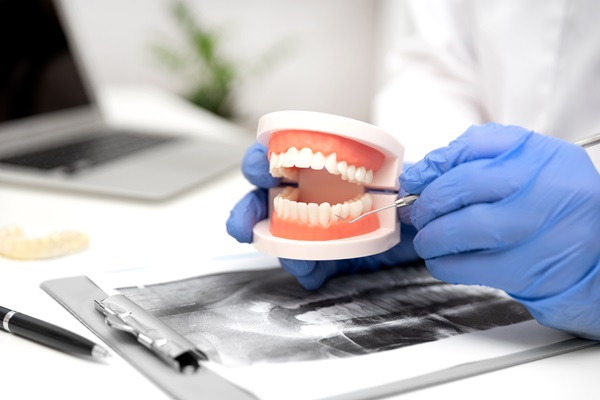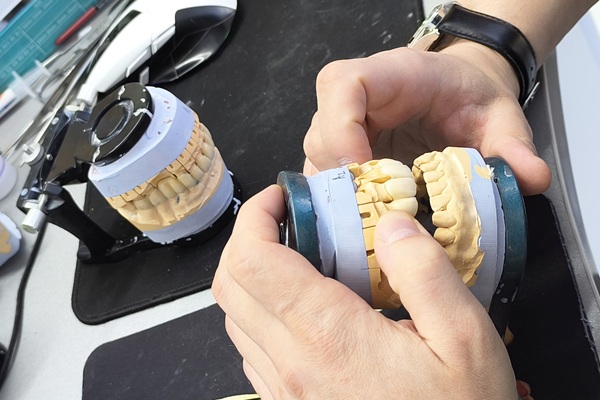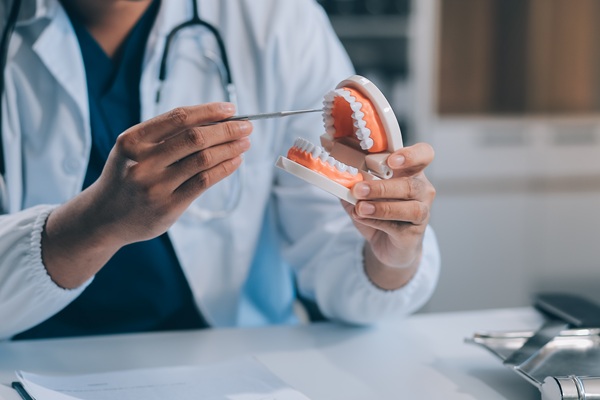What You Need to Know About Partial Dentures

An article by GlaxoSmithKline Consumer Healthcare states that more than 18 million people wear partial dentures. Anyone who has been considering getting partials to improve their speech, ability to chew, and even their appearance is not alone. It helps to have the proper information beforehand, though.
What materials are used to create partials?
Partials are created from a wide variety of materials, each of which has its own advantages and disadvantages.
Metal
Some partials are made from titanium or cobalt chrome. Metal dentures tend to have a more precise fit and claps that attach more easily to the surrounding teeth to improve stability. Since metal is stronger, dentures made from the material are often less bulky as well. However, metal has disadvantages. It is typically much more expensive and can take much longer to make the partials. Additionally, metal is not as aesthetically pleasing as other materials.
Plastic and polymers
Plastic and polymers are becoming more popular for partial dentures because they are more affordable than metal options. Plastics are also more aesthetically pleasing because they can be made to match the natural teeth and do not have any visible metal pieces. They are easier to make, easier to repair, and are lighter and more flexible when wearing. Plastic is not as durable but can still last for many years when properly taken care of.
Thermoplastics
Another option for partials is thermoplastics. Lightweight thermoplastics are flexible, and because of that, dentures made from them are called flexible dentures. Despite their flexibility making them more comfortable, some people avoid these types of dentures because they feel they are inconvenient. Flexible dentures need to be warmed in water for a couple of minutes before insertion into the mouth, thereby creating flexibility. They are also often bulkier because they can break if made too thin, according to one research review.
Caring for partials
There are several important steps to taking care of partials. First, when the patient receives them, a dentist may have them wear the dentures for an extended period of time. This is so that the patient can determine how they feel in the mouth and whether there are any areas that are uncomfortable or painful that need to be adjusted.
Once adjusted, the dentures should be worn during the day but should always be taken out at night and soaked in a dental cleaning solution. Consistent cleaning is essential for ensuring dentures continue to work properly and look like natural teeth. In addition to using the cleaning solution, it is important to brush the partials with a soft-bristled toothbrush and toothpaste made specifically for dentures.
Frequent checkups are also an essential part of proper denture care. As a person ages, the shape of the mouth changes, and dentures need to be adjusted periodically. Without adjustments, partials will become uncomfortable and may even cause sores in the mouth.
Taking proper care of dentures helps to prolong their life. However, should the partials break, it is important to stop wearing them and to talk to the dentist about replacements.
Conclusion
Partial dentures are available in a variety of materials and at several price points, making them an excellent treatment plan for many people.
If you are interested in learning more about partials and whether they are right for you, contact your dentist for more information.
Check out what others are saying about our dental services on Yelp: Dentures and Partial Dentures in Tucson, AZ.
Recent Posts
If your dentures don't fit anymore or have some missing teeth, you need a denture reline to make them fit and look good again. Denture relining is the best option if you have weak or damaged teeth that cannot be used as anchors to retain your dentures. If you have natural teeth, the dentist will…
You may have to send your dentures to a laboratory during a denture repair depending on the type and severity of the concern that is being addressed. This review discusses when a denture repair requires a laboratory’s assistance in ensuring the quality of the dentures at the completion of the denture repair.A minor denture repair…
Dentures are a common tooth replacement option and one of the oldest methods available. But did you know that there are two different types of dentures? You can either get partial dentures, which only replace certain teeth, or full dentures, which replace an entire section. Each of these dentures can be done in a few…
Dentures are one of the most affordable ways to restore your smile if you are missing teeth. These devices consist of false teeth that are attached to a plastic base that keeps it secure in your mouth. Dentures are arguably the best option for those who have lost all or most of their natural teeth.One…


